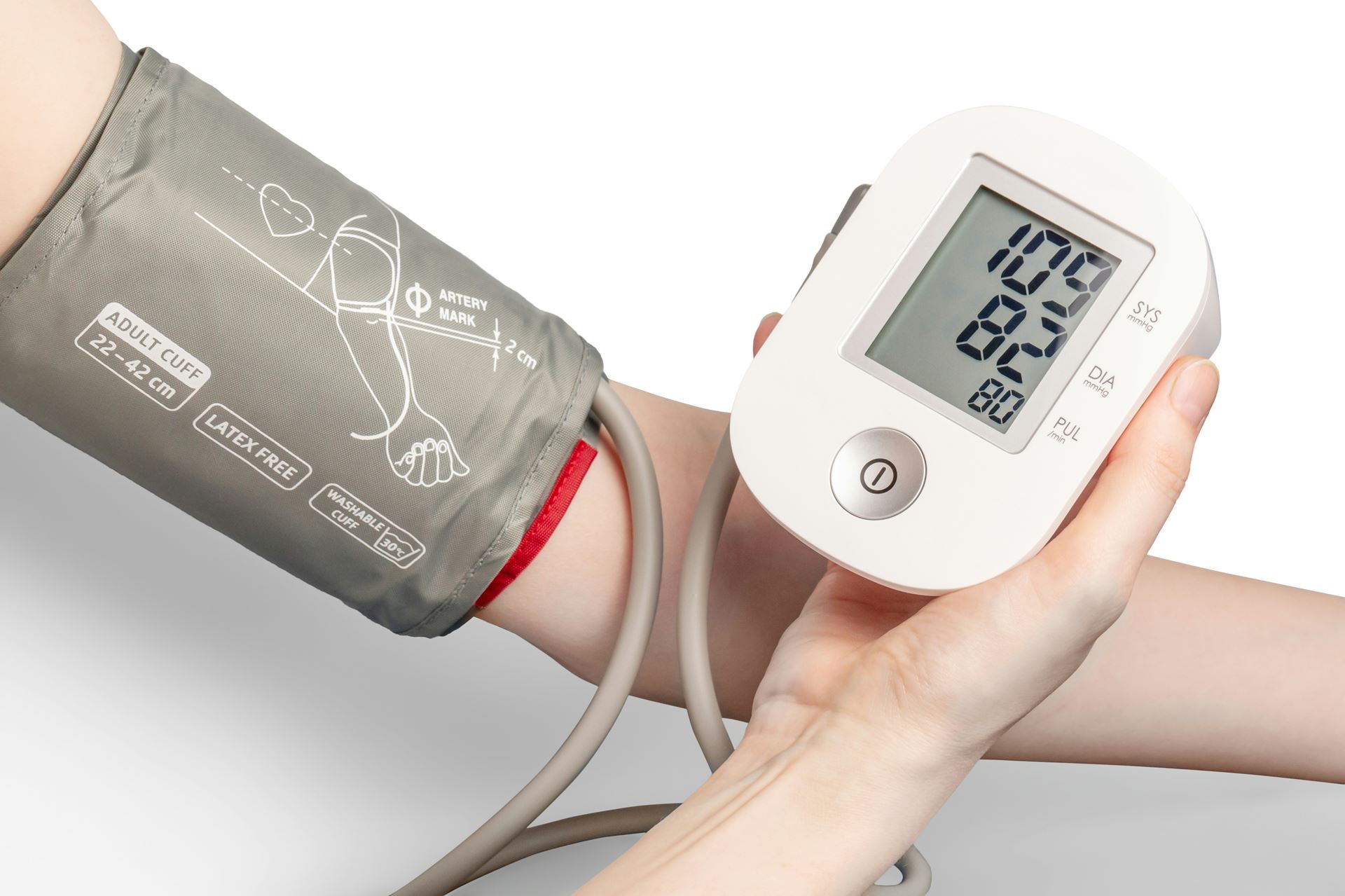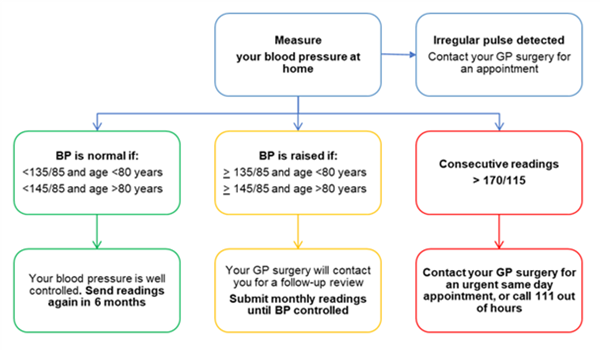High Blood Pressure Information
High Blood Pressure: What You Need to Know
This page explains what high blood pressure means, how it can affect your health, and what you can do to help.
What is Blood Pressure?
Blood pressure is the force of your blood pushing against the walls of your blood vessels as your heart pumps.
- When your heart beats, the pressure is higher (called systolic).
- When your heart rests, the pressure is lower (called diastolic).
A typical reading for an adult might be 120/70. The first number is systolic, the second is diastolic.
There isn’t one “perfect” blood pressure, just like there isn’t one “perfect” height.
What is High Blood Pressure?
High blood pressure means your reading is higher than what is healthy for you.
A reading of 140/90 or more is often considered high.
Who is at Risk?
- About 1 in 5 adults in the UK have high blood pressure.
- It is more common in men and in older adults.
What Causes High Blood Pressure?
Most of the time, there is no clear cause. This is called essential hypertension, and it can run in families.
Sometimes, it happens because of another health problem (less than 1 in 20 cases).
It can also happen temporarily in pregnancy.
Is High Blood Pressure Dangerous?
You usually feel fine, but high blood pressure can increase your risk of:
- Heart attack
- Stroke
For example:
If a middle-aged man’s blood pressure goes up by 10 points, his risk of heart attack or stroke rises by 20%.
What Are the Symptoms?
Most people feel well.
Very high blood pressure can cause:
- Dizziness
- Shortness of breath
- Blurred vision
- Headaches
What Can Help?
Lifestyle changes are very important. Sometimes, they are enough.
If not, your doctor may suggest medicine. You might need to try different types before finding the right one.
Common medicines include:
- Water tablets (diuretics) – help your kidneys remove salt.
- Beta-blockers – make your heart beat less strongly.
- ACE inhibitors – relax blood vessels.
- Calcium blockers – relax blood vessels.
- Alpha-blockers – relax blood vessels.
What Can You Do?
Here are some changes that can help lower blood pressure:
- Keep a healthy weight
- Eat less salt
- Eat more fruit and vegetables
- Exercise daily – even a brisk 20-minute walk helps
- Reduce stress
- Stop smoking – your GP can help
- Drink less alcohol – no more than 14 units a week, with some alcohol-free days
For more information please see:
British Heart Foundation:
https://www.bhf.org.uk/informationsupport/risk-factors/high-blood-pressure
Blood Pressure UK:
https://www.bloodpressureuk.org/


Home Blood Pressure Readings and How to Measure
Why Check Your Blood Pressure at Home?
Checking your blood pressure at home is a great way to look after your health. Here’s why:
- More accurate readings – Some people feel nervous at the doctor’s, which can make blood pressure look higher. Home checks show what your blood pressure is most of the time.
- Track your progress – If you are making changes or taking medicine, home readings help you and your doctor see if it’s working.
- Spot problems early – Regular checks can find high blood pressure before it causes harm.
- Stay motivated – Seeing your numbers can encourage you to keep up healthy habits.
- Save time – Fewer trips to the surgery mean less hassle for you.
For more information on how to take your blood pressure at home:
My Home Blood Pressure Diary (To download a copy: My Blood Pressure Diary.docx)
Name:
Date of Birth:
|
Date |
Morning BP |
Morning Pulse |
Evening BP |
Evening Pulse |
Notes |
|
Day 1 |
|
|
|
|
|
|
Day 2 |
|
|
|
|
|
|
Day 3 |
|
|
|
|
|
|
Day 4 |
|
|
|
|
|
|
Average:
|
/ |
|
/ |
|
|
How to Work Out Your Average:
Ignore Day 1 (practice day).
Add all the top numbers (systolic) and divide by how many readings you did.
Do the same for the bottom numbers (diastolic).
Choosing a Monitor:
Use a monitor that is clinically checked. See the link below or ask a pharmacy.
www.bihsoc.org/bp-monitors/for-home-use
Where to Buy:
You can buy monitors from the maker, at local pharmacies (Boots, Lloyds), or online (Amazon, John Lewis).
Before You Measure:
- Wait 30 mins after eating, smoking, coffee, or exercise.
- Use the same arm your doctor uses.
- Wear loose clothes.
- Sit quietly for 5 mins.
- Rest your arm at heart level.
- Keep feet flat and stay relaxed.
How to Measure:
Watch this video: https://youtu.be/AXCFcftkric
1. Follow your monitor’s instructions.
2. Put cuff 2cm above elbow.
3. Sit still, don’t cross legs.
4. Take 2 readings, 1–2 mins apart, morning and evening for 4 days. Log the lowest reading on this sheet.
5. If readings differ a lot, take 2–3 more.
6. Write numbers exactly as shown.
7. Return diary (and monitor if borrowed) to your GP.
Helpful Links:
- Blood Pressure UK:
http://www.bloodpressureuk.org/your-blood-pressure/how-to-lower-your-blood-pressure/monitoring-your-blood-pressure-at-home/-
NHS Guide:
https://www.england.nhs.uk/ourwork/clinical-policy/cvd/home-blood-pressure-monitoring/

Page created: 07 October 2025